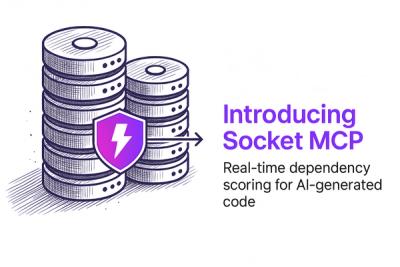
Product
Secure Your AI-Generated Code with Socket MCP
Socket MCP brings real-time security checks to AI-generated code, helping developers catch risky dependencies before they enter the codebase.
Surfline API bindings and types in JS with no external dependencies.
The publicly available Surfline API is undocumented, but relatively easy to call. However, the response types are often quite messy, and at times inconsistent.
This library provides more clarity of response types by providing rigorous Typescript bindings for the available Surfline API calls.
$ npm install surfline --save
This library exposes three Surfline API calls:
fetchTaxonomy -- used to fetch location entitiesfetchForecast -- used to fetch forecasts for spotsfetchSpotInfo -- used to fetch surf spot informationimport {fetchTaxonomy} from 'surfline';
import {fetchEarthTaxonomy} from 'surfline/taxonomy';
fetchTaxonomy({id: <some-id>}).then((res: TaxonomyResponse) => {
// do something with result...
// eg. fetch all taxonomies in res.contains
})
// `fetchEarthTaxonomy` can also be used as a convenient starting point
fetchEarthTaxonomy().then((res: TaxonomyResponse) => { ... })
import {fetchForecast} from 'surfline';
fetchForecast({spotId: <some-spot-id>, type: 'wave'})
.then((res: WaveForecast) => {
// do something with result...
})
import {fetchSpotInfo} from 'surfline';
fetchSpotInfo({spotIds: [...]}).then((res: SpotInfoResponse) => {
// do something with result...
})
fetchTaxonomy
function fetchTaxonomy(q: TaxonomyQuery): Promise<TaxonomyResponse>
function fetchEarthTaxonomy(q?: {maxDepth: number}): Promise<TaxonomyResponse>
type TaxonomyType = 'spot' | 'subregion' | 'region' | 'geoname';
export type TaxonomyQuery = {
id: string,
// Most queries should use `type=taxonomy`
// If setting `type`, ensure `id` references a taxonomy of that type
// (eg. if `type=spot` use `SpotTaxonomy.spot` as id)
type?: 'taxonomy' | TaxonomyType,
// `maxDepth` controls how many "levels" of data is returned
// eg. if fetching "Earth" taxonomy, a depth of 0 returns continents,
// while a depth of 1 returns continents and countries
maxDepth?: number,
};
// individual xTaxonomy types omitted... see type files for more details
type Taxonomy = SpotTaxonomy | SubregionTaxonomy | RegionTaxonomy | GeonameTaxonomy;
type TaxonomyResponse = Taxonomy & {
in: Taxonomy[],
contains: Taxonomy[],
};
fetchForecast
function fetchForecast<T extends ForecastType>(q: ForecastQuery<T>): Promise<ForecastResponse[T]>
export type ForecastType
= 'wind'
| 'wave'
| 'rating'
| 'tides'
| 'weather'
| 'conditions'
// Provides an overview all all other forecasts,
// but doesn't give the same level of detail as individual forecasts
| 'combined';
export type ForecastQuery<T extends ForecastType> = {
spotId: string,
type: T,
// Specifies how far out you want the forecast
// Some forecasts are limited 6 days max w/o access token
days?: number,
// Specifies granularity of data
// (eg. `intervalHours=3` returns 8 forecast items per day)
// Ignored for type = `tide` (defaults to 1 hour), and `conditions` (defaults to 12 hours)
intervalHours?: number,
};
// individual xForecast types omitted... see type files for more details
export declare interface ForecastResponse {
wind: WindForecast;
wave: WaveForecast;
rating: RatingForecast;
tides: TideForecast;
weather: WeatherForecast;
conditions: ConditionsForecast;
combined: CombinedForecast;
}
note: a subset of forecasts are available for subregions via the surfline API, but that is not currently exposed by this library
fetchSpotInfo
function fetchSpotInfo({spotIds}: SpotInfoQuery): Promise<SpotInfoResponse>
type SpotInfoQuery = {
spotIds: string[]
};
// `SpotInfo` type omitted... see type files for more details
type SpotInfoResponse = {
associated: {
units: Units
},
data: SpotInfo[]
}
npm install
npm run build
// or
npm run watch
FAQs
Surfline API bindings and types in JS with no external dependencies
The npm package surfline receives a total of 0 weekly downloads. As such, surfline popularity was classified as not popular.
We found that surfline demonstrated a not healthy version release cadence and project activity because the last version was released a year ago. It has 1 open source maintainer collaborating on the project.
Did you know?

Socket for GitHub automatically highlights issues in each pull request and monitors the health of all your open source dependencies. Discover the contents of your packages and block harmful activity before you install or update your dependencies.

Product
Socket MCP brings real-time security checks to AI-generated code, helping developers catch risky dependencies before they enter the codebase.

Security News
As vulnerability data bottlenecks grow, the federal government is formally investigating NIST’s handling of the National Vulnerability Database.

Research
Security News
Socket’s Threat Research Team has uncovered 60 npm packages using post-install scripts to silently exfiltrate hostnames, IP addresses, DNS servers, and user directories to a Discord-controlled endpoint.